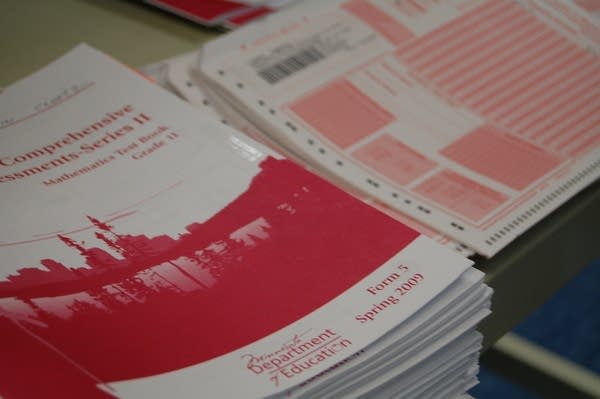State considers new ways of testing students
Go Deeper.
Create an account or log in to save stories.
Like this?
Thanks for liking this story! We have added it to a list of your favorite stories.

For students and teachers in Minnesota, this time of year is all about testing.
From March until early May, students take the Minnesota Comprehensive Assessment tests or MCAs. The reading, writing, math and science tests tell state and federal officials how students and schools are performing.
But the annual tests follow a number of other tests students take during the year -- from daily exams to international assessments. Some educators say it's time to reevaluate the testing Minnesota students take.
Toward that end, Minnesota lawmakers are considering a bill this session that would tweak assessment testing in Minnesota by aligning high school assessments with the tests students take to get into college, like the ACT.
Turn Up Your Support
MPR News helps you turn down the noise and build shared understanding. Turn up your support for this public resource and keep trusted journalism accessible to all.
The measure would allow the state Department of Education to put more MCA tests online and make them more robust. It also would eliminate the GRAD exams students need to pass to obtain a diploma.
Such changes are necessary because with so many current tests, students aren't quite sure which tests are the most important, said Erik Sivertson, a physics and physical science teacher in Milaca, Minn.
"I think that all gets lost," Sivertson said. "The students [say] 'Well this test counts, this one doesn't. This one affects the school districts, this one doesn't.'"
The Minnesota Comprehensive Assessments could be considered the state's most important test. The stakes are high because the test tracks how students are doing and by extension how schools and teachers perform.
Older students need to pass the reading and writing portion of the test to receive a diploma. They don't have to pass the math portion, but if they fail it three times, they need to show they're proficient by doing extra work or other projects.
Tom Dooher, the president of the teachers union Education Minnesota, thinks the state is obsessed with high stakes testing. He said teachers spend too much time preparing students for their MCAs.
That, he said, means teachers "teach kids testing strategies, teach them about what our some ways to dissect a question, taking practice tests, then taking times to do the tests then retest for those that didn't do well."
Dooher said the MCAs are not a useful tool for teachers, because most of the results take months to roll in.
"They come back the next school year," he said. "Those students you had in 4th grade you're getting the results when they're in 5th grade so it really doesn't make any sense."
This is the third year the Minnesota Department of Education has allowed schools to give students an online version of the MCA math test, partly in an effort to give teachers speedier data.
On Tuesday a computer server glitch prevented some students from completing their tests. No problems were reported when students started their testing again on Wednesday.
But it's another example of what teachers see as the hassle of testing. Glitches can throw students off and hurt their test scores.
Adding to the overall load of testing, about half of Minnesota's 471 school districts do something called MAP testing to measure students' academic progress in a way they say the MCAs fall short.
Minnesota education commissioner Brenda Cassellius said the state's goal is to improve the MCAs, make them less intrusive and something teachers can use throughout the year, like MAP tests. She wants the MCAs to be the test districts rely on.
"It could mean less testing if districts choose to eliminate all other testing and just use the state tests," Cassellius said.
Although the proposed legislation aims to make changes, but it wouldn't necessarily reduce the amount of testing students face. But that's not a problem, said Michael Rodriguez, an associate professor in the University of Minnesota's College of Education and Human Development.
"If we found very effective ways of using all of that testing information to inform teaching and learning, to improve teaching and learning, then the volume of testing wouldn't be such an issue," he said.
Rodriguez said testing in schools has yet to strike the perfect balance between providing teachers with the data they need to help students, while not taking too much time away from learning.




